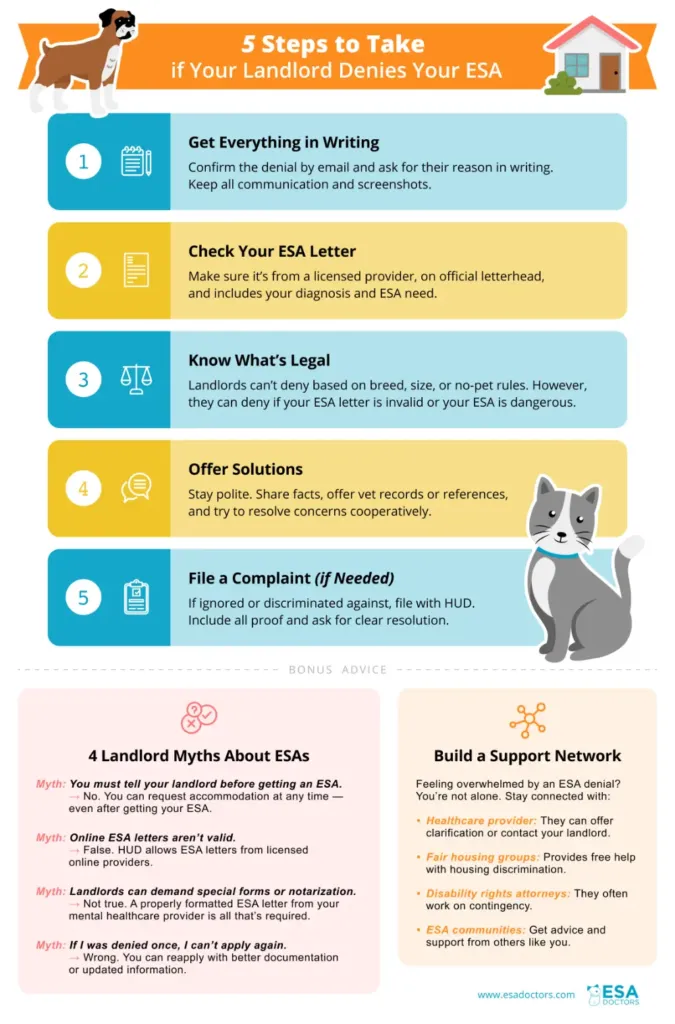Being denied for your emotional support animal feels like a shock, especially after you sent in an ESA letter and informed your landlord, as you were supposed to. If your landlord gave you a “no” and you’re now wondering what went wrong and what to do next, you’re reading the right guide.
If your landlord has denied your emotional support animal, follow these 5 steps:
- Get the denial in writing, which should include the reason(s) for the denial
- Check if your ESA letter is clear, legitimate, and contains all the information needed
- Understand which denial reasons are valid and which aren’t
- Proactively respond to any legitimate concerns
- As a last resort, escalate the issue to HUD
We’ll also touch on common myths that trip ESA owners up, and provide some tips on building your support network if you ever need help dealing with your landlord.
First, let’s break down each step so you know exactly what to do.
Step 1: Get Everything in Writing
If your landlord just told you “no” on the phone or during a conversation, you’ll need more than that. Immediately send them an email summarizing the conversation. Something like:
“Hi [Landlord’s name], just to confirm our conversation today at [time], you denied my emotional support animal request. Could you please provide this denial in writing, along with the specific legal basis for the denial?”
Having the denial in writing with all the reasons serves two purposes: first, it gives you a roadmap for addressing their concerns, and secondly, you want a paper trail if your landlord is not treating you fairly. Many landlords don’t realize they have to respond to ESA requests within 10 days and work with tenants in what HUD calls an “interactive process” to resolve potential issues.
Be sure to save every email, text message, and communication. Take notes with dates and times of any phone calls. Screenshot anything digital. Think of yourself as a detective gathering evidence — because that’s essentially what you’re doing.
Step 2: Check if Your ESA Documentation is Solid
If your ESA letter doesn’t meet HUD guidelines, even a supportive landlord might legally deny your request. Better to fix this now than fight an uphill battle.
Your ESA letter needs the following:
- Written and signed by a licensed mental health professional (therapist, psychologist, psychiatrist, counselor, social worker, etc.)
- On official letterhead with the provider’s license number
- States that you have a mental or emotional disability
- Explains that your animal provides emotional support that helps with your disability
If your ESA letter needs to be fixed, contact your healthcare provider immediately and ask them to make the necessary corrections. If your mental health professional is at a loss or you need someone who can help you with a legit ESA letter, click on the link below and work with an experienced licensed professional online.
Step 3: Understand Which Denial Reasons Are Valid and Which Aren’t
Many landlord denials are based on a misunderstanding. Knowing which denial reasons are legitimate versus which are illegal discrimination helps you respond appropriately.
These are some of the excuses that landlords can’t use:
- “We don’t allow pets” (remember, ESAs aren’t pets under Fair Housing law)
- Breed, size, or weight restrictions
- Requiring pet deposits or monthly pet fees
- Demanding you use their specific forms or get notarization
- Claiming your animal is “too big” for the unit
These are possibly valid reasons for denial:
- Your ESA letter doesn’t meet HUD requirements
- Your specific animal poses a direct threat to others’ safety
- The housing is exempt from the Fair Housing Act (such as owner-occupied buildings with 4 or fewer units)
Knowing when a landlord can deny an ESA and when they can’t will determine how you approach the next step.

Step 4: Proactively Respond to Address Legitimate Concerns
Even when landlords are wrong, approaching them with solutions rather than confrontation often gets better results more quickly. You want to be right AND effective.
If they’re citing invalid reasons, politely educate them about the law. Send a friendly email explaining that emotional support animals are accommodation animals, not pets, and attach a copy of HUD guidance. Many landlords genuinely don’t know the law and will reverse course when educated.
If your landlord actually has legitimate concerns, work with them to address specific issues. Offer to provide:
- Vaccination records and veterinary health certificates
- References from previous landlords about your animal’s behavior
- A trial period to demonstrate that your animal won’t cause problems
- An updated ESA letter that meets HUD’s requirements
Here’s an example of what you can say if your landlord offered an invalid reason for denial:
“Thank you for letting me know about your concerns. I wanted to clarify that under Fair Housing Act requirements, emotional support animals are assistance animals, not pets, so pet policies don’t apply to my accommodation request. I’m happy to provide any reasonable documentation about my animal’s health and behavior. Could we schedule a time to discuss how to move forward with my accommodation?”
Remember, HUD encourages landlords and tenants to work together in good faith to resolve accommodation requests. Document your willingness to cooperate — this becomes important evidence if you need to file a complaint later.
For more information about working with landlords, read our article Landlord and Emotional Support Animal Relations.
Step 5: Escalate to HUD (as a Last Resort)
Sometimes education and cooperation aren’t enough. When landlords dig in their heels and you feel they’re in the wrong, more drastic measures might be needed. For example, if your landlord does the following, you might need to escalate things further:
- Refuses to respond to your accommodation request
- Makes discriminatory comments about disabilities or emotional support animals
- Threatens eviction because you requested accommodation
- Demands prohibited medical information
- Won’t engage in any discussion about your request
Always try to politely cooperate with your landlord if they:
- Seems confused about the law but willing to learn
- Have specific, addressable concerns about your animal
- Respond to your communications
- Show a good-faith effort to work with you
If all else fails and your landlord is stonewalling you or blatantly discriminating against you because you need an ESA, think about filing a complaint with HUD. These are the steps to take if you go that route:
- Go to HUD.gov and file online, or call 1-800-669-9777
- Include all your documentation (emails, letters, photos)
- Be specific about dates, times, and what was said
- Explain how you tried to resolve the issue directly
- Request specific relief (accommodation approval, damages, policy changes)
For more details on the complaint process, click on this link: How to File an ESA Housing Discrimination Complaint with HUD.
Common Myths That Trip People Up
Myth: “I have to tell my landlord before I get my animal.
While it’s good practice to request accommodation before bringing your ESA home, you can request accommodation at any time. Late requests don’t justify denial.
Myth: “Online ESA letters aren’t valid.”
HUD explicitly states that getting ESA letters from online, remote providers is okay.
Myth: “Landlords can require specific forms or notarization.”
Landlords must accept your healthcare provider’s ESA letter if it follows the correct format. They can’t require you to use their forms or get additional certifications.
Myth: “If I was denied once, I cannot try again.”
You can resubmit with additional documentation, a better explanation, or after addressing legitimate concerns.
Learn more about timing your ESA letter submission here: When Do I Have to Tell My Landlord About My ESA?
Building Your Support Network
If you’re dealing with the stress of a landlord rejection, don’t go through it alone. Dealing with ESA denials can be emotionally draining, especially when you’re already managing mental health challenges. Build a support team by connecting with the following individuals and communities:
- Your healthcare provider
Keep them informed about housing challenges. They may be able to provide additional clarification or speak to your landlord. - Local fair housing organizations
Most cities have nonprofit groups that provide free assistance with housing discrimination. - Disability rights attorneys
Many work on contingency fees for clear Fair Housing violations. - Other ESA owners
Online communities and support groups can provide practical advice and emotional support.
Housing discrimination doesn’t just violate the law — it causes real harm. Keep notes about how the denial affects your mental health, daily functioning, and relationship with your ESA. This will become a part of your damages claim if you need to file a complaint.






Leave a Comment